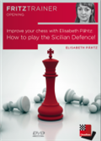Focusing on the players
Classical chess can be exciting, and getting slow games to be entertaining has a lot to do with who is playing — talk about an obvious proposition. The organizers of the Wijk aan Zee events know it all too well, as they avoid the usual pitfalls related to trying to put forth ‘the strongest tournament ever’, or something of the sort, and focus instead on bringing together a mix of extremely strong players (ratingwise) and ambitious, fighting contenders.
 Smyslov cultivated a clear positional style and even in sharp tactical positions often relied more on his intuition than on concrete calculation of variations. Let our authors introduce you into the world of Vasily Smyslov.
Smyslov cultivated a clear positional style and even in sharp tactical positions often relied more on his intuition than on concrete calculation of variations. Let our authors introduce you into the world of Vasily Smyslov.With the likes of Daniil Dubov, Jan-Krzysztof Duda, Richard Rapport and Shakhriyar Mamedyarov in the lineup, we are all but guaranteed to at least see a couple of exciting encounters in every round. Moreover, in this year’s edition, two of the aforementioned players are sharing first place after five rounds — Rapport and Mamedyarov won with white on Thursday to join Vidit Gujrathi in the lead of the Masters.
Exciting draws were also on the menu in round 5. Nils Grandelius and Magnus Carlsen fought hard out of a sharp Sicilian; Fabiano Caruana got winning chances in a double-edged position against Andrey Esipenko; while Duda agreed to a draw in a winning position against Sergey Karjakin, as he was running very low on time shortly before move 40.

Good friends — Anish Giri drew co-leader Vidit with the white pieces | Photo: Lennart Ootes
Two decisive results
After kicking off the event with three straight draws — ‘despite’ playing enterprising chess — Mamedyarov collected his second consecutive victory in round 5, as he got the better of Jorden van Foreest with the white pieces. We did not mention the Dutchman in our introduction’s list of fighting players, but the defending champion has been playing some of the most exciting chess in the tournament.
In a rather imbalanced opening setup, the contenders followed theory until move 14, when they deviated from a correspondence-chess game played in 2018. Things got markedly sharp quickly afterwards.
At first sight, it looks like White blundered a piece, as removing the knight from d4 could be followed by 19...c4, forking bishop and queen. However, White here has 19.Bc2, threatening mate on h7 and gaining a tempo to save his piece — this is also the first suggestion of the engines. But Van Foreest wanted more, and he opted for a sharper alternative: 19.e6
Cold-bloodedly, Shakh responded with 19...Be8, and there followed 20.Ng5 f5 21.Nf7
Once again, Black was confronted with a tough decision, and once again Shakh was up to the task, as he found the one continuation that gave him an advantage — 21...Rxf7 22.exf7+ Bxf7 23.Nxf5 c4
 These DVDs are about Understanding Middlegame Strategies. In the first DVD dynamic decisions involving pawns are discussed. The second DVD deals with decision making process concerning practical play.
These DVDs are about Understanding Middlegame Strategies. In the first DVD dynamic decisions involving pawns are discussed. The second DVD deals with decision making process concerning practical play.
Both players had correctly calculated the sharp sequence of captures, which continued with 24.Bxc4 Nxf5 (not 24...dxc4 due to 25.Qxd8+ Rxd8 26.Nxe7+) 25.Bxa6. Unfortunately for Van Foreest though, entering this line was not favourable for White — of course, it was impossible to foresee that Black would not falter in the complex struggle, while evaluating all the potential resulting positions is never easy, even for top grandmasters.
Once the dust settled, Black had two pieces for a rook in an endgame with queens still on the board. The conversion was not at all trivial, but a mistake by Van Foreest on move 35 allowed Shakh to regroup, making his task easier to handle.
Going for activity with 35.Qb7+ was the right alternative for White, while the defensive 35.Rc1 gave Black a key tempo to reroute his queen with 35...Qc7.
Shakh coordinated his army successfully and collected the full point nine moves later.

Fearless — Shakhriyar Mamedyarov | Photo: Jurriaan Hoefsmit
Much like in the game shown above, Rapport and Praggnanandhaa followed theory until move 14 out of an imbalanced opening variation. In the ensuing struggle, Rapport showcased his hard-earned ability to navigate complex positions — activating his king in a sharp middlegame proved to be the right decision down the stretch.
White here ignored his bishop on g2 and went for Black’s b-pawn with 46.Kc7. Importantly, after 46...Nxg2, the rook can grab the dangerous black passed pawn with 47.Rxd2, as the king is no longer blocking the rook along the file.
Rapport captured his opponent’s queenside pawn on the next move and went on to push his connected passers until provoking Pragg’s resignation on move 56.
You can go through both decisive games of round 5 in the replayer below.
The Scandinavians’ Sicilian
In their direct encounter, the Swedish and the Norwegian in the field did not go for 1.e4 d5 (the Scandinavian Defence), but entered a sharp struggle in the Sicilian instead. Grandelius had the white pieces and saw his famed opponent going for an adventurous (and incorrect) pawn push on move 18.
 The continuous stream of new ideas in the Sicilian makes 1..c5 the most popular answer to 1.e4. On this DVD I do give an introduction to the most important Sicilian systems.
The continuous stream of new ideas in the Sicilian makes 1..c5 the most popular answer to 1.e4. On this DVD I do give an introduction to the most important Sicilian systems.
Carlsen’s 18...d5 — instead of the more sensible 18...Nf7 or 18...Bc6 — allowed White to get the initiative with 19.Bxb5+. Naturally, given the position’s complexity, extreme precision was needed to prove White’s advantage, and after 19...Kf8 Grandelius failed to correctly evaluate that 20.Qb4+ was the best continuation for White — the Swedish grandmaster did think for 17 minutes before choosing 20.Ba4, rerouting his bishop to the more stable b3-square.
The mayhem continued, with Carlsen later missing some chances as well. A draw was signed on move 54, with the contenders and friends — Grandelius worked as Carlsen’s second at the 2018 World Championship match — sharing a smile as they shook hands after a hard-fought battle.

Magnus Carlsen and Nils Grandelius | Photo: Official site
Round 5 results
Standings after round 5
All games - Round 5
Replay all the Masters’ games at Live.ChessBase.com
Arjun keeps on winning
There is no stopping 18-year-old Arjun Erigaisi in the Challengers tournament, as the Indian collected his fourth consecutive win to get a one-point lead atop the standings table. Arjun defeated Russian rising star Volodar Murzin with the white pieces.
 In over 4 hours in front of the camera, Karsten Müller presents to you sensations from the world of endgames - partly reaching far beyond standard techniques and rules of thumb - and rounds off with some cases of with own examples.
In over 4 hours in front of the camera, Karsten Müller presents to you sensations from the world of endgames - partly reaching far beyond standard techniques and rules of thumb - and rounds off with some cases of with own examples.
In this heavy-piece endgame — which the engines evaluate as very slightly better for Black — it was the older player (Murzin is only 15!) who proved to be stronger technically. Murzin lost the thread shortly before the time control and ended up losing the 71-move encounter.
Three players are sharing second place on 3½ out of 5, with Surya Ganguly and Rinat Jumabayev winning in round 5 to join Thai Dai Van Nguyen in the chasing pack.

The Challengers | Photo: Jurriaan Hoefsmit
Round 5 results
Standings after round 5
All games - Round 5
Replay all the Challengers’ games at Live.ChessBase.com
Links
























